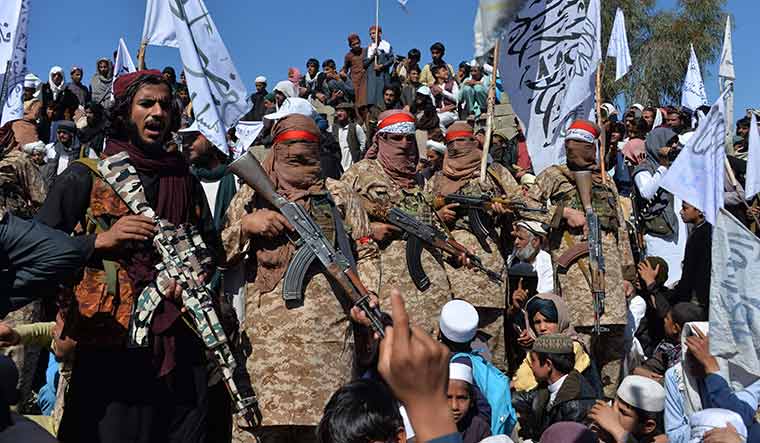US PRESIDENT DONALD Trump made his first direct contact with the Taliban on March 3 as he spoke by telephone to Abdul Ghani Baradar, who heads its political office. The warm conversation between the erstwhile antagonists was a wake-up call for India. The US wants to get out of Afghanistan fast and the Taliban is now firmly in the saddle. Once again, it is advantage Pakistan.
“The Taliban is beholden to Pakistan as it operates out of Quetta and Peshawar,'' said Tilak Devasher, former special secretary, cabinet secretariat and member, National Security Advisory Board. The Doha agreement signed by the US and the Taliban on February 29 brought calm for barely 24 hours. The Taliban launched attacks across Afghanistan after President Ashraf Ghani refused its demand to release 5,000 militants before the start of formal peace talks among Afghan groups. Trump's phone call was aimed at stopping the violence. After the call, he said the Taliban would be killing “some very bad people”.
India is worried because the “very bad people” are unlikely to be its enemies. Moreover, the deal will put an end to sanctions against the Taliban and will help it return to the mainstream. In return, the Taliban only needs to ensure that it will not target the US or its allies. That promise, however, does not extend to India. “The deal serves the US and the Taliban,'' said Rana Banerji, former special secretary in the cabinet secretariat. “Whether it will lead to peace remains doubtful.''
Apart from the security concerns, India is also faced with a diplomatic challenge. “We kept on talking about an Afghan-owned, Afghan-led and Afghan-controlled peace process when all others had moved on,'' said Rakesh Sood, former ambassador to Afghanistan. India is one of the few countries which has refused to engage with the Taliban. Baradar did not name India while thanking the countries that supported the peace deal, while Pakistan received a special mention.
The deal puts in jeopardy the fate of the newly-elected Afghan government, which is supported by India. The Taliban has been dismissive of the Ghani government, calling its leaders puppets. “To my mind, the real negotiations will start now,'' said External Affairs Minister S. Jaishankar at a public event in New Delhi, referring to the upcoming intra-Afghan dialogue. The talks are bound to be difficult. The Doha agreement does not name the Ghani government as a dialogue partner. Instead, it says the Taliban will start negotiations with “Afghan sides''. Devasher said the agreement allowed the Taliban to keep the Ghani government out of the process and pick and choose its dialogue partners, enabling it to go for “separate ceasefires with separate groups”.
India is carefully assessing the situation. Foreign secretary Harsh Vardhan Shringla was in Kabul on February 29 to meet senior Afghan leaders. He conveyed India's support for a reconciliation process which can lead to sustainable peace.
Any uncertainty spells trouble for India. “If Afghanistan descends into civil war or if the Taliban takes control, there will be security implications,'' said Devasher. “The Taliban will allow Lashkar-e-Taiba bases. It is problematic for us, especially as the government has been proactive about hitting back at terrorists. A lot of Afghan fighters will be freed from fighting. There is also the danger that Pakistan will shift its focus eastward.”


